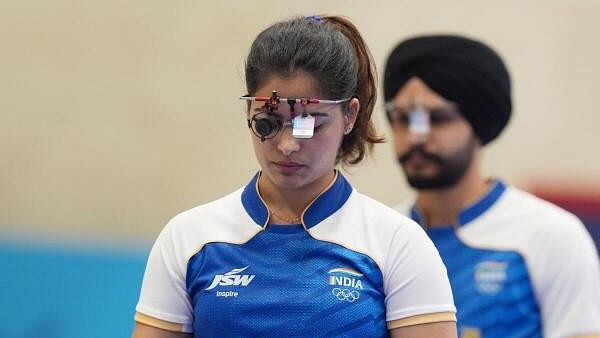
Manu Bhaker (left) and Sarabjot Singh won the 10m Air Pistol Mixed Team Bronze Medal.
Credit: Reuters Photo
Chateauroux: Just to put things into perspective, it took independent India 56 years since the modern Olympic Games began in 1986 at Athens to win an individual medal. Legendary wrestler KD Jadhav accomplished that at the 1952 Helsinki Games when he won the freestyle 57kg bronze.
India, a powerhouse in hockey with eight Olympic gold medals but minnows in overall context, then had to wait another 44 years to see an individual stand on the podium in a non-team event.
Tennis stalwart Leander Peas did that at the 1996 Atlanta edition when he bagged a bronze in singles competition.
India had to wait for over a century to see a woman wear a medal around her neck, Karnam Malleswari proving to be the path-breaker at the 2000 Sydney Games when she stunned even travelling journalists from the country by securing a bronze in 69kg weightlifting competition.
Although India sport ambitions of hosting the Olympic Games in the future it wasn’t until 2012 London they saw an athlete win medals in individual competitions in separate Games for the first time — wrestling great Sushil Kumar accomplishing it following the 2008 Beijing triumph.
No athlete hitherto in independent India’s history had won two medals at a single Games. Hell, winning a medal itself was an achievement for a country that is still miles away from being called a sport-loving nation. This is the weight of history, almost as massive as the country itself, that sat on the slender shoulders of Manu Bhaker as she teamed up with Sarabjot Singh in the 10M air pistol mixed team bronze medal at the Chateauroux Shooting Range on Tuesday.
The 22-year-old dimpled shooter carried that all with the grace of a ballet dancer. Showing absolutely no nerves whatsoever and taking an inexperienced Sarabjot along beautifully like a senior pro would do, Bhaker was in a league of her own as her heroics ensured India defeated the Korean duo of Wonho Lee and Ye Jin Oh 16-10 quite comfortably to send not just the shooting contingent but a country into raptures.
At a range where history was made on Tuesday when Zorana Arunovic and Damir Mikec won Serbia’s first gold medal in shooting, Bhaker etched her name into Indian sporting folklore by becoming the first from the country to bag two medals in a single Olympics.
Squaring up against Lee and Ye Jin, Bhaker, a second time Olympian and having already won a bronze in the 10m air pistol individual event on Sunday, she knew had to do the heavy lifting against the Koreans. Ye Jin had smashed the Olympic record in winning the individual medal in the same discipline while Lee had finished fourth in the corresponding men’s event.
Barring an 8.3 in the eighth series, Bhaker was simply exceptional right throughout, opening with seven successive scores in the 10s. That and some poor shooting from Lee, who could only manage 9s from the third till the eighth series, ensured India shot themselves to a 10-6 lead.
Drawing inspiration from Bhaker, the 22-year-old Sarabjot too started to gain confidence as the match progressed. Following a word with coach Munkhbayar Dorjsuren, Sarabjot started to find his range and India then put themselves on the verge of clinching a second medal at the range by storming to a 14-6 lead.
They were just one round away from securing victory but pressure of match point saw both Bhaker and Sarabjot misfire as the Koreans delayed the inevitable. Bhaker and Sarabjot regained their composure from that bout of nerves with scores of 10.6 and 10.2 but theYe Jin and Lee fired 10.8 and 10.2 respectively to push the context into another series.
Bhaker and Sarabjot drew their breath in, re-channelled their focus and fired 10.2 and 9.4. It was a poor score but Ye Jin and Lee misfired as well, scoring 9.0 and 9.5 respectively. The stands erupted in applause and Bhaker and Sarabjot clenched their fists in a muted manner before shaking hands at having accomplished a massive mission.